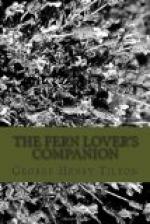In moist meadows or rarely on dry slopes. “Overlooked rather than rare.” New England states and in general widely distributed. July. Often grows in company with the ragged orchis. The ancient ointment known as “adder’s speare ointment” had the adder’s tongue leaves as a chief ingredient, and is said to be still used for wounds in English villages.
“For them that are with newts or
snakes or adders stung,
He seeketh out a herb that’s called
adder’s tongue.”
[Illustration: Adder’s Tongue. Ophioglossum vulgatum]
Var. minus, smaller; fronds often in pairs. The sterile segment yellowish-green, attached usually much below the middle of the plant. Sandy ground, New Hampshire to New Jersey.
Var. Engelmanni. (Given specific rank in Gray.) Has the sterile segment thicker and cuspidate, the stipe slender and the secondary veins forming a fine network within the meshes of the principal ones. Virginia and westward.
Var. arenarium. (From the Latin, arena, meaning sand, being found in a sandy soil.) Probably a depauperate form of Ophioglossum vulgatum and about half as large. A colony of these ferns was discovered growing in poor soil at Holly Beach, New Jersey.
KEY TO THE GRAPE FERNS
(Botrychium)
Plant large, fruiting in June, sterile part much divided:
Rattlesnake
Fern.
Plant smaller:
Fruiting in autumn, sterile
part long-stalked, triangular.
Common
Grape Fern.
Fruiting in summer:
Plant
fleshy, sterile part mostly with lunate segments.
Moonwort.
Plant
less fleshy, segments not lunate:
Sterile
part short-stalked above the middle of the stem.
Matricary
Fern.
Sterile
part stalked usually below middle of stem.
Little
Grape Fern.
Sterile
part sessile near the top of the stem.
Lance-leaved
Grape Fern.
GRAPE FERNS
Botrychium
Rootstock very short, erect with clustered fleshy roots; the base of the sheathed stalk containing the bud for the next year’s frond. Fertile frond one to three pinnate, the contracted divisions bearing a double row of sessile, naked, globular sporangia, opening transversely into two valves. Sterile segment of the frond ternately or pinnately divided or compound. Veins free. Spores copious, sulphur yellow. (The name in Greek means a cluster of grapes, alluding to the grape-like clusters of the sporangia.)
(1) MOONWORT. Botrychium Lunaria




